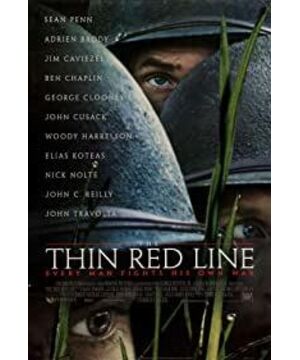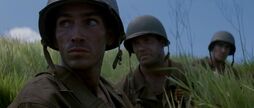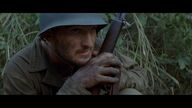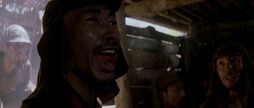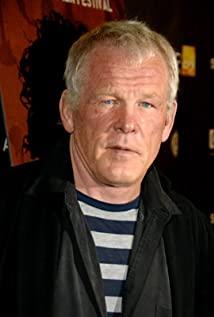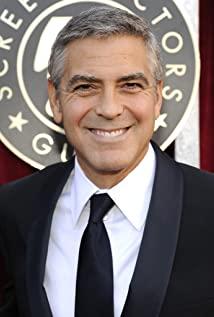I haven’t watched a movie so seriously in front of the TV for a long time. Most of the movies shown on the TV are commercial films with weak underbelly. I am glad that I saw this last Berlin Golden Bear Award in the 20th century on CCTV6 this time. The winner of the film "The Thin Red Line". This movie, in my opinion, is definitely a shocking classic, even though it just missed the Oscars. After watching it, it was like a stick in my throat, and I was depressed and uncomfortable. Why there is war is not clear, and what the war left is not only the human beings in the image, the scars of the natural world, but the reflection of human beings and the thinking of human nature after facing the war and experiencing the war. This is more of a movie that emphasizes "spirit". The stream of consciousness of the inner monologue is not always reminding the viewer to reflect, reflect on war, and reflect on human nature. The opening of the film is a monologue. In the Guadalcanal Islands in the South Pacific, the camera depicts a picturesque scenery like a peach blossom garden, with luscious grass, colorful fallen leaves, and children playing innocently. As a war-based movie, the opening chapter did not create the large-scale Normandy landing of "Saving Private Ryan", but replaced it with a peach blossom-like poetry and painting, and after the war, things are different. The film uses a large number of close-ups and close-ups, whether it is the green grass dancing in the wind or the birds breaking out of the jungle, staggering and struggling in the baptism of war, highlighting the contradiction between war and nature. The beach grab in the first half, the brotherhood of brothers, and the fragility of life, maybe we will hate the Japanese on the other side of the war with the narrative of the camera, until the success of the beach grab, what the camera describes is not the joy of victory in the war, but It is the change of human nature after the war. The Japanese are also victims of the war. They also have emotions. A large number of cameras are aimed at the dazed and desperate enemies of the captured enemy. The bloody footage also confirms the cruelty and ruthlessness of the war. Where does the war come from, there is no reason or root cause. "Is our death beneficial to the world? Can it nurture life and reproduce all beings? Does God also have a dark side?" The characters' massive inner monologues are filled with reflections on the war, however, the war must go on, and life, brotherhood, may be gone in an instant. People's lives have already existed, and those who survive will live better. After experiencing the edge of life and death, they may grow up overnight, and the dead brothers will never walk out of the shadow of war. The entire company lost his brothers, the soldiers lost their lives, Staro lost his position as company commander, Jack lost the love of his wife, and Witt lost the island. The trust of the residents is also the most distressing scene. The cruelty of the war made Witt recall the original Peach Blossom Land, and when he returned here again, he was already strangers to them, and the most primitive residents were also deeply affected by the war. The influence, the distortion of human nature, is often at the moment of experiencing life and death. Even if the scenery changes under the baptism of war, the transformation of people's psychology can never be stitched together! The unbearable lightness in life is like a thin red line between the devil and the angel. Survival or destruction has become the first issue in this film. To address the subjective problem of justifying this, the narrative sometimes stops momentarily. Let us choose and judge for ourselves. "Apocalypse Now" interprets the distortion and alienation of human nature brought by war to human beings with a large amount of space, "Field Platoon" also focuses on depicting the dark side of war, and Kubrick's "Full Metal Shell", resolutely human Has become a machine of war, dehumanized. And "The Thin Red Line" does leave too much selectivity, at least it allows us to see the unique green plant by the sea still swaying in the breeze.
Another great part of the film is that when it seems to be over, the story continues. When the film bombs the bunker, it can almost end, and the image gradually slows down. The swaying bamboo wind chimes, and the wooden house in the woods are riddled with holes. , The light and beautiful birds, the grand celebration feast, all the daze seems to have an outlet, and the Japanese prisoners under the camera focus on the war, wailing, praying, confused, and speaking a language that no one can understand, A seemingly victorious victory does not end the film, but instead begins another war, until Witt's death, which brings once again a deeper reflection, "An hour is like a month, a day is like a year. , live in my memory forever, be with me forever." Starro's monologue is a little weak, his hope is very simple, he just doesn't want my soldiers to die, this is up to him to decide, no one can Can't dominate. War only turns them into beasts and corrupts their souls. In the film, people with different keynotes, different beliefs, personalities, and psychological processes, while colliding with the war, remain powerless and the inevitable transformation of human nature. This is the corruption of the popularization of human nature. The contrasting settings and similar endings of several main characters in the film reveal the essence of war destroying everything, and everything will not be spared. The wonderfulness of this film is unparalleled. It can be said that the war has influenced this film, while the monologue in the film has influenced everyone's measure, measure and measure. No matter how many classic anti-war films there are, no matter how many destructive traces left by the war, and the war continues, such a trend, there will never be a paradise in the world!
View more about
The Thin Red Line reviews


